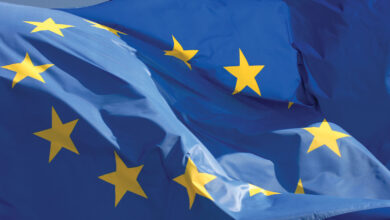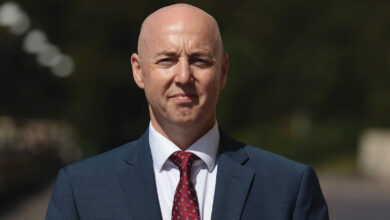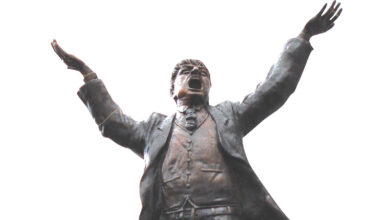Time to say goodbye

Addressing the DUP party conference as party leader for the last time, Peter Robinson told party delegates that Northern Ireland was on the motorway to a better future.
November was a busy month for the DUP, fresh from agreeing the ‘Fresh Start’ deal the party held its annual conference at the La Mon hotel in Newtownards. On the eve of the two day conference, party leader and Northern Ireland’s First Minister, Peter Robinson announced his intention to retire. This decision brings an end a career in politics and the DUP that lasted over 44 years.
Addressing the conference, Robinson told his party colleagues that he had intended to leave a year ago but his timetable and the political process did not quit run in sync. However, he has since announced his resignation as DUP leader, with effect from early January. He will be replaced by Arlene Foster.
Reflecting on his time as leader of the party Robinson, who thanked his entire family for the sacrifices they have made for him, said he was “exceedingly honoured” to have led a party which played such a key role in his life. “I have lived in the DUP from the day of its birth, he said. “I recall the endless hours shaping its structure and message. I remember my nomadic existence in the party’s early years as I travelled the highways and byways to build up its branches and membership. When it all began for me, several political lifetimes ago, the DUP was but an irritant to the political establishment, now we are the largest party of government in Northern Ireland.”
Robinson also offered his thanks to party colleagues, Nigel Dodds and Arlene Foster. Dodds he described as a “faithful, loyal and wise” friend and Foster, a friend who is not frightened by hard work and someone who “never refuses to help when asked and is always the first to offer support.” Former Health Minister Jim Wells, was also mentioned by Robinson who claimed he had faced more adversity than any man warrants and told him that he and his wife are “constantly in our prayers.”
Looking ahead, Robinson addressed the issue of the party’s new leader. He warned his eventual successor that they will face some difficult moments but promised that the strife is worth it and that the party must continue to look forward, with aspirations focused on more than the border pole. With 38 seats in the assembly, many political commentators feel that Robinson leaves the party at its height of their political power. Yet the Belfast man believes his party can achieve more, claiming the 2011 election was little more than a “launch pad for future success.”
Achievements
Looking back over the past 12 months Robinson reflected on a period of great electoral success for the party that saw it retain its position as Northern Ireland’s largest party and increase its vote share. There was also a large amount of praise for the DUP’s newest MP, Gavin Robinson, who took the East Belfast seat back from the Alliance Party’s Naomi Long. There was however a moment of condolence for William McCrea who lost his seat to the UUP’s Danny Kinahan.
The general election itself was touched on by Robinson. At one point many commentators felt the DUP may hold the balance of power in any coalition government, this did not come to pass as the Conservatives surprisingly took a majority of 12 seats. However, Robinson feels that this small majority will not see the government through a full term and will present his party with the opportunity to play a vital role at some point during this parliamentary cycle. “We may not yet hold the balance of power at Westminster but make no mistake, in the coming months and years of this parliament, our influence and our pivotal role will grow and grow,” he said. “As we said during the election, ‘more votes, more seats, more for Northern Ireland.’ I can assure you, when that day comes, we will use our influence wisely.
Fresh start
Having agreed to a new deal a short time before the party conference, it was no surprise that much of Robinson’s speech was dominated by it. He admitted that he had been around in politics long enough to know that no deal is ever the last deal and that there is no finish line in politics but claimed that the new deal “does mark a fundamental break with the past and a solid foundation for the future.”
Claiming that the fundamental block on politics in Northern Ireland for the past three years was the failure of some to accept welfare cuts, Robinson said this deal removes the obstacles to progress and provides the “most generous arrangements in the UK to protect the most vulnerable.” The First Minister also told his party colleagues that the deal will mean more can be spent on public services like health and education and help over 100,000 Northern Ireland families who will be affected by the change to tax credits.
The deal will, Robinson believes, provide the platform for Northern Ireland to create and sustain a “buoyant and balanced local economy” that will provide fantastic opportunities for the country’s youth and deliver on the DUP’s efficiency agenda. This new economy will have fewer government departments and a more streamlined and strategic Executive office. In his defense of the agreement, Robinson tore into Mike Nesbitt and the Ulster Unionist Party, a party he claimed “fled the battlefield” and who he accused of playing “political chicanery” with the recent political situation. “Anyone can set out their own position and favoured outcome,” said Robinson. “But it requires courage and competence to negotiate a successful agreement with political opponents.”
As he left the party stage, for the last time as party leader, Robinson thanked his party colleagues for their “unwavering loyalty, support and kindness and assured them that as he steps down as leader of the DUP “our party is sound, our province is safe and the Union is secure. Ulster is no longer at the crossroads – we’re on the motorway and on a clear path to a better future.”





